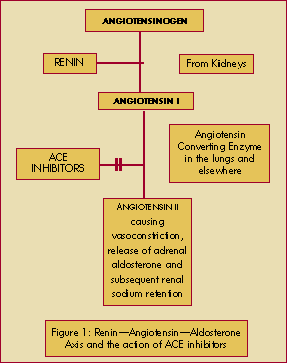D'Arcy L. Little, MD
Chief Resident, Family Medicine, Sunnybrook Health Science Centre, North York, Ontario
Background
Angiotensin Converting Enzyme inhibitors (ACE inhibitors) interact with the body's renin-angiotensin-aldosterone axis. Angiotensinogen (alpha-2 globulin) is converted to angiotensin I or AG-I (inactive) by renin released by the kidney in response to renal ischemia, hypotension, hypovolemia or depletion of sodium ions. ACE inhibitors block the conversion of AG-I to AG-II. AG-II is a powerful vasoconstrictor, as well as a releaser of aldosterone (an adrenal cortical hormone that leads to sodium retention in the kidney), see Figure 1.
| FIGURE 1 |
 |
Despite the fact that elderly patients have lower levels of plasma renin than their younger counterparts, ACE inhibitors have been evolving as important agents in the treatment of several cardiovascular diseases in both younger and older patients.

